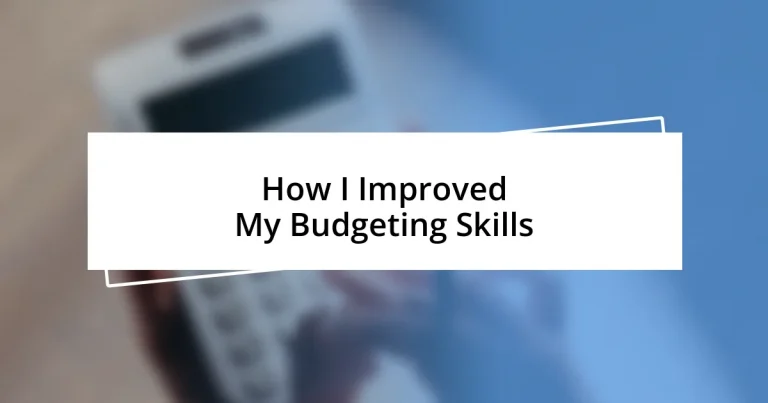Key takeaways:
- Identifying and addressing impulsive spending habits enhances overall budgeting effectiveness.
- Setting clear, specific financial goals transforms budgeting into a motivating roadmap rather than a chore.
- Regularly tracking expenses and adjusting budgets fosters control and allows for flexibility in financial planning.
- Celebrating small financial milestones reinforces motivation and encourages positive budgeting behaviors.
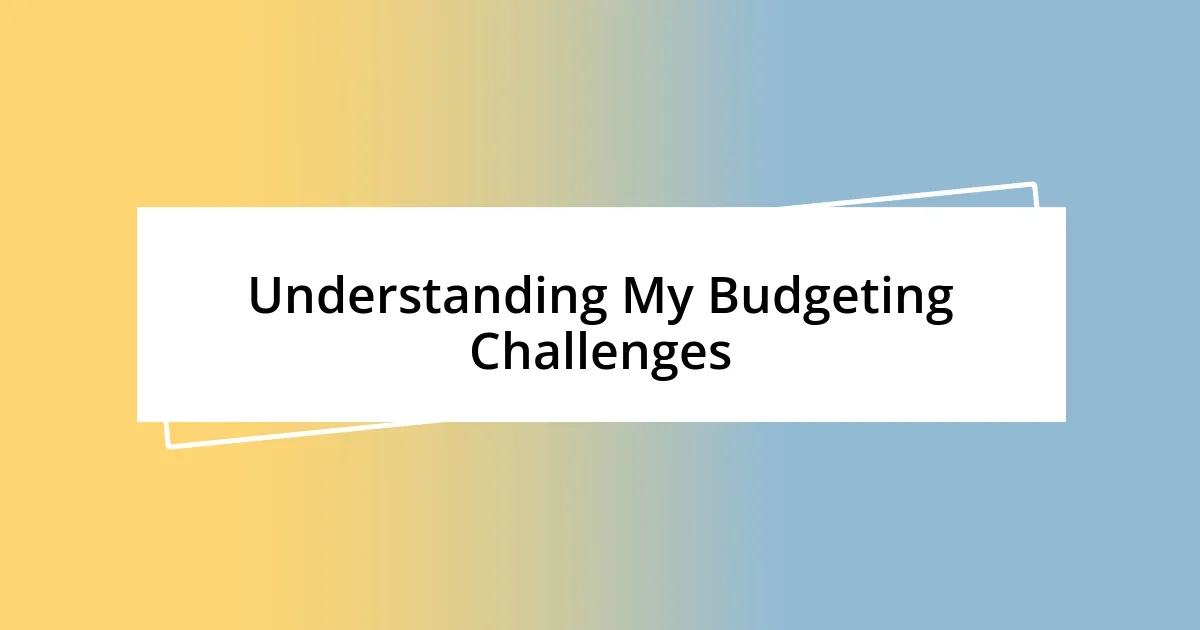
Understanding My Budgeting Challenges
When I first dug into budgeting, I found myself drowning in a sea of numbers and categories. I remember staring at my bank statements, feeling overwhelmed and confused—why couldn’t I just keep it simple? This chaotic situation made me realize that my biggest challenge wasn’t just the budgeting itself; it was my refusal to confront my spending habits.
One specific challenge that stood out was my tendency to splurge on impulse buys. I can recall a moment in a clothing store, where I justified purchasing a fancy jacket I didn’t need with thoughts like, “It’s on sale! How can I resist?” That moment taught me a valuable lesson about distinguishing between wants and needs. Reflecting on it, I couldn’t help but wonder: how many of us make these same excuses without realizing the long-term impact on our financial health?
Additionally, I struggled with the inconsistency of my income, which often threw my budgeting efforts out the window. As a freelancer, my paychecks fluctuated, causing me unnecessary anxiety about making ends meet. This unpredictability tested my resolve, pushing me to adapt my strategies and prioritize different aspects of my budget more rigorously. Have you ever felt the pressure of fluctuating income? It’s a wild ride that requires constant adjustment and a strong financial game plan.
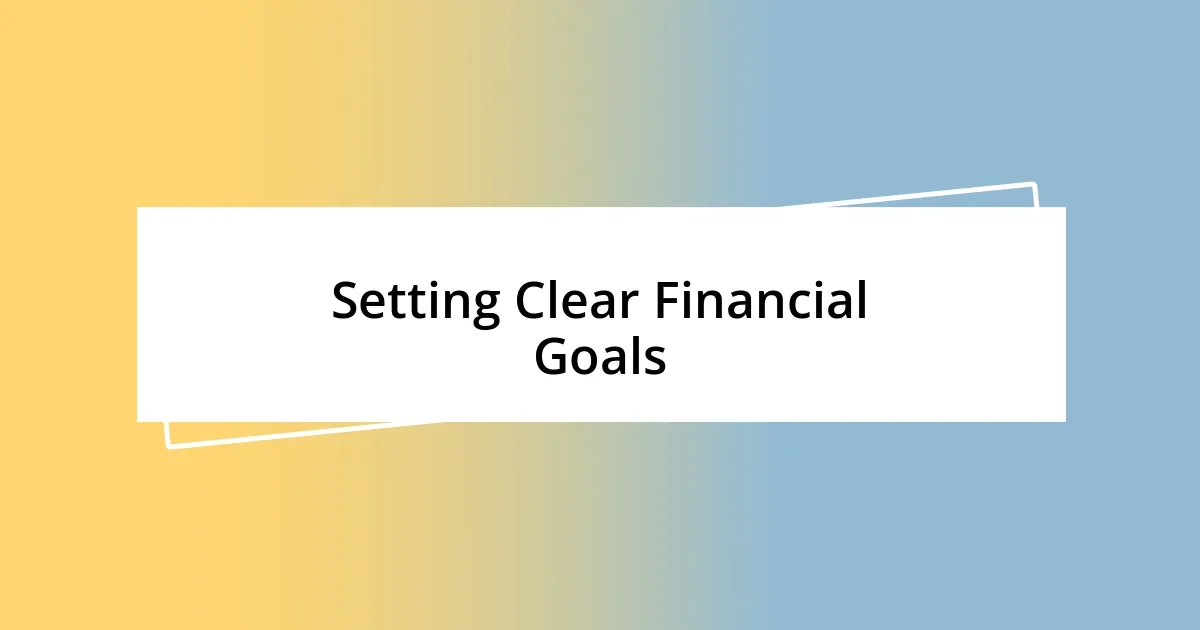
Setting Clear Financial Goals
Setting clear financial goals transformed my entire approach to budgeting. I remember sitting down one evening, determined to take control of my finances. I grabbed a notebook and started jotting down what I truly wanted: a vacation, a new laptop, and a savings fund for emergencies. It felt empowering to see those dreams in writing, and suddenly, budgeting became less of a chore and more of a roadmap to achieving those goals.
As I refined my financial objectives, I learned the importance of specificity. Instead of vague ideas like “save money,” I began articulating precise targets—like saving $5,000 for a trip to Italy within two years. This clarity not only motivated me but also allowed me to break down my goals into manageable monthly savings. Just imagine having a clear target to aim for; it’s like having a GPS instead of wandering in the dark.
Lastly, I discovered the value of revisiting and adjusting my goals regularly. Life can toss unexpected expenses your way, and I certainly faced my share: a major car repair last year hit me hard. By reassessing my goals during these moments, I learned to stay flexible and resilient, making necessary adjustments rather than abandoning my financial dreams altogether.
| Type of Goal | Example |
|---|---|
| Short-term | Save for a new phone within 6 months |
| Medium-term | Save $10,000 for a home down payment in 3 years |
| Long-term | Retire with $1 million saved by age 65 |
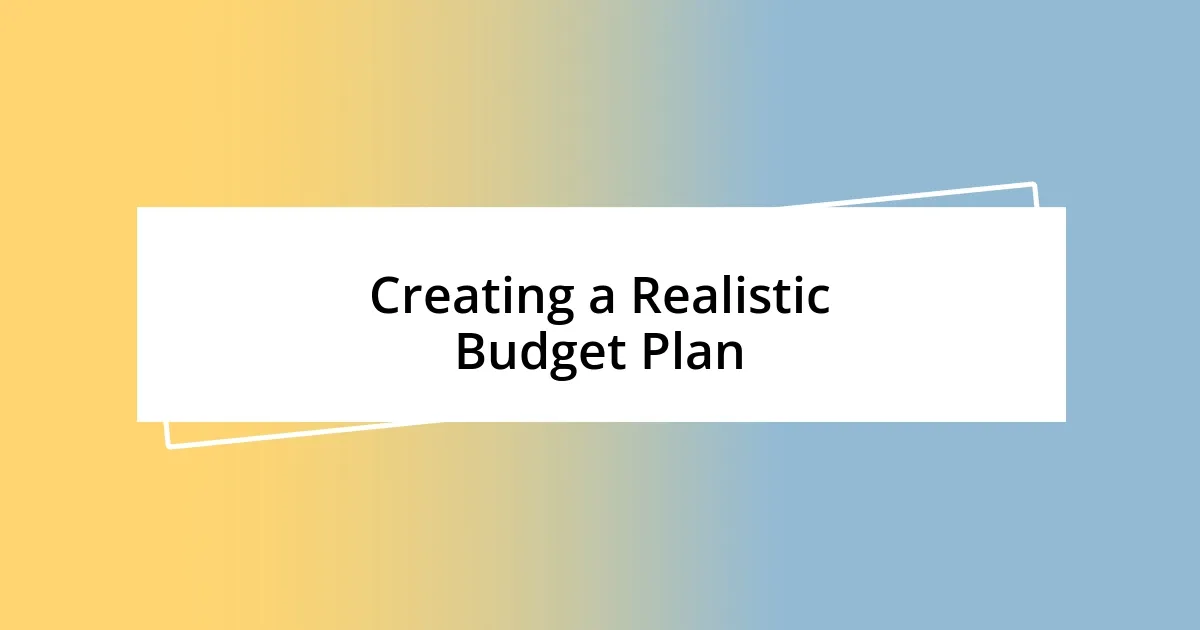
Creating a Realistic Budget Plan
Creating a realistic budget plan was a game changer for me. I remember feeling the thrill of mapping out my income and expenses on a spreadsheet for the first time. It shocked me to see where my money was really going; the coffee runs and dining out added up more than I cared to admit. I learned firsthand that a budget isn’t about restricting spending; it’s about taking control of it.
Here are some steps that helped me establish a realistic budget plan:
- Track All Expenses: I used an app for a month to log everything. The insights were eye-opening!
- Categorize Spending: I divided my expenses into essentials (rent, groceries) and non-essentials (entertainment, dining).
- Set Limits: I assigned a specific amount for each category, ensuring I didn’t overspend.
- Review and Adjust: Monthly reviews became my routine. I’d look for trends and make necessary changes.
- Incorporate Savings Goals: I set aside a portion of my income first before allocating to other categories. This made saving a priority rather than an afterthought.
There’s something satisfying about seeing that budget come together, and I can’t tell you how much lighter it felt once I had a structured plan in place. Each time I adhered to it, I felt a little more empowered, and every small victory helped build my confidence in managing my finances effectively.
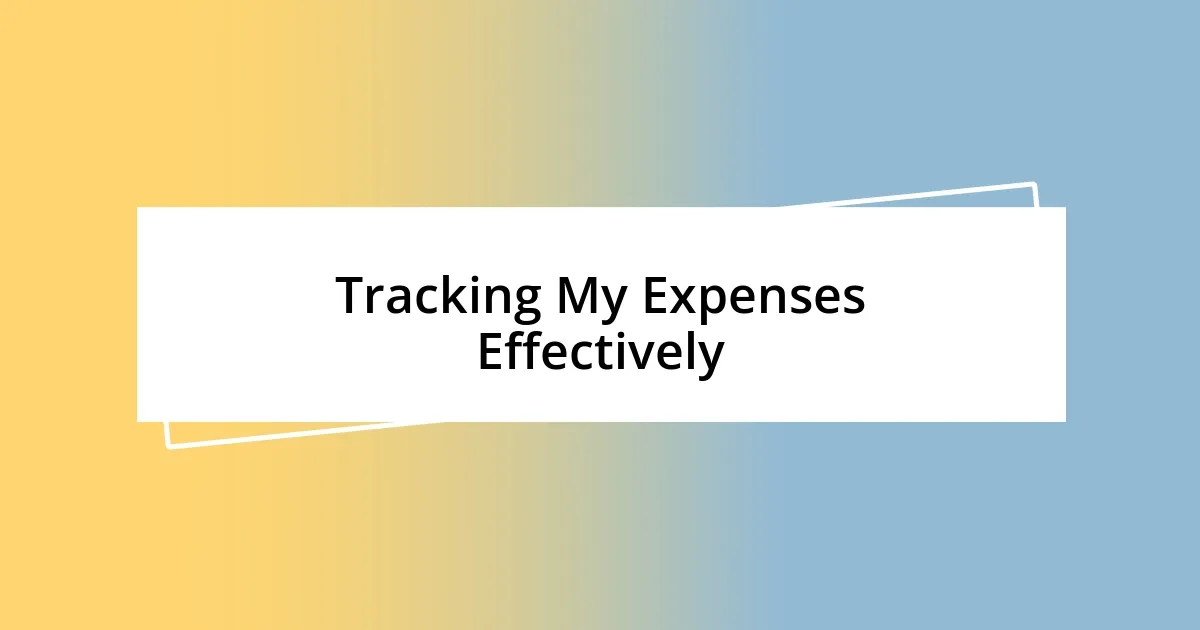
Tracking My Expenses Effectively
Keeping track of my expenses has been a real eye-opener for my budgeting journey. Initially, I thought I could handle it by just keeping mental notes. However, I quickly realized that forgetting even one small purchase could throw off my entire month. So, I decided to use a simple mobile app to track every expense, and let me tell you, it was a game changer! It was a bit daunting at first; seeing all those transactions laid out in front of me made me feel vulnerable. But knowing where every dollar went felt like gaining a superpower.
As I continued tracking my expenses, I started to notice patterns I hadn’t seen before. Who knew that my impulse buys at the coffee shop could equal the cost of a nice dinner out? I began categorizing my spending into needs and wants, which really illuminated my habits. This breakdown made it easier to identify areas where I could cut back without feeling deprived. Have you ever felt that satisfaction when you realize you don’t need that extra latte when you can make coffee at home? That’s what I experienced, and it felt liberating.
Over time, I developed a habit of reviewing my expenses weekly. This routine not only kept me accountable but also created a space for reflection. I’d sit down, cup of tea in hand, and evaluate my spending. Did I stick to my budget? Where could I improve? It was like having a little financial check-up each week—a moment to celebrate victories or recalibrate when I overspent. This practice instilled a sense of control and confidence that transformed my approach to everything else in my financial life. Have you ever tried something similar? It might just provide you with the clarity and empowerment you’ve been looking for.
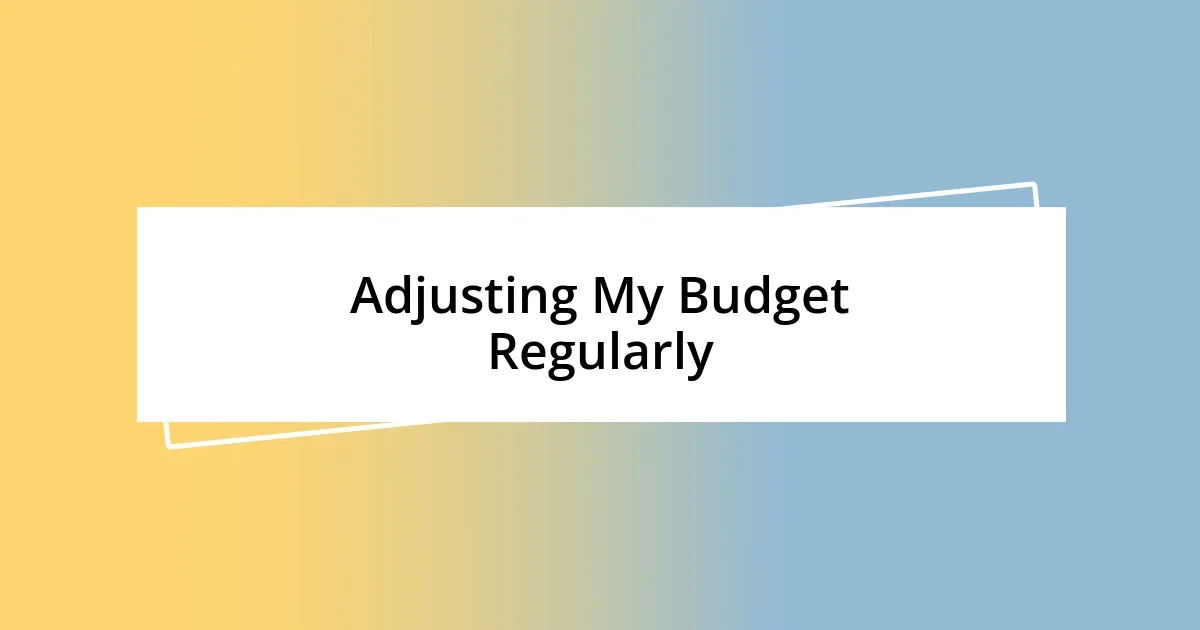
Adjusting My Budget Regularly
When I began to adjust my budget regularly, I quickly learned the importance of staying flexible. Just because I set a budget doesn’t mean it should be carved in stone. Life happens, right? For instance, there was that month when my car unexpectedly needed repairs. I had to reevaluate my categories to accommodate this surprise expense. Instead of feeling frustrated, I viewed it as an opportunity to adapt and prioritize.
Regularly reviewing my budget became a refreshing ritual for me. I made it a point to sit down at the end of each month, coffee in hand, and compare my actual spending against my budgeted amounts. I remember one month distinctly when my grocery bill soared due to my newfound love for cooking. Rather than ignoring it, I adjusted my grocery budget and cut back on dining out. It felt like a small victory, knowing that I had the power to make these shifts and stay on track.
I often ask myself, “How can I improve my financial health without sacrificing my lifestyle?” This mindset shift has driven my approach to budgeting. Adjusting my budget regularly allows me not only to stay in control but also to enjoy life, knowing I’m making responsible choices. By accepting that my budget is living and breathing, I can enhance both my spending habits and my overall financial well-being. Have you ever felt the freedom that comes from being able to adapt your financial plan? It’s truly liberating!
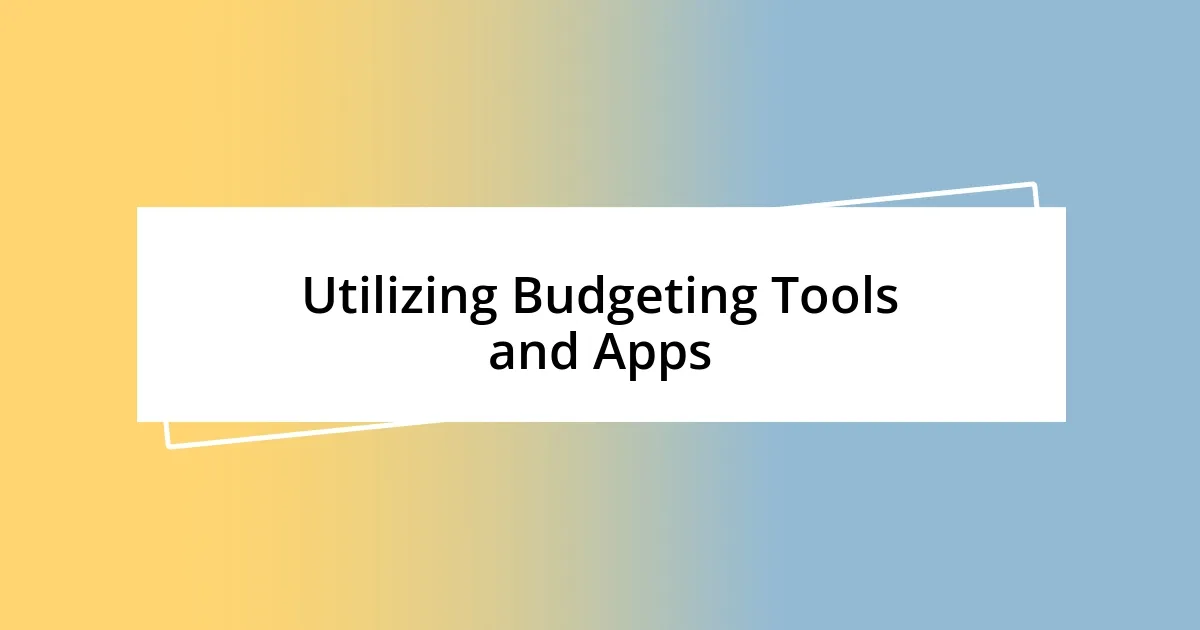
Utilizing Budgeting Tools and Apps
Utilizing budgeting tools and apps really made a significant difference in my financial journey. At first, I was skeptical about relying on technology. However, once I found an app that resonated with my needs, it felt like having a financial advisor right in my pocket. The convenience of tracking my budget in real time was a game changer, and I felt empowered every time I logged my expenses. Have you ever experienced the satisfying moment of checking off a goal on an app? It’s those little dopamine hits that keep me motivated.
One feature that I absolutely love is the ability to set alerts for when I’m nearing my budget limits. There were times I’d get a reminder right after a spontaneous purchase, and let me tell you, those nudges were sometimes just what I needed to rethink my choices. It’s almost like having a buddy gently reminding me of my goals. I can still recall one instance when I was about to splurge on a pair of shoes. Thanks to the app’s alert, I paused and thought about how that purchase would impact my budget, ultimately leading me to prioritize my savings instead. Isn’t it amazing how a little nudge can steer us away from impulsive decisions?
Furthermore, the ability to visualize my progress through charts and graphs has been exceptionally motivating. Each month, I look at how much I’ve saved compared to previous months, and it feels incredible to witness that growth. I remember a month where I managed to stick to my budget and even had extra savings to allocate towards a mini-vacation. I celebrated that success by treating myself to an experience rather than material things. Have you ever felt that exhilarating rush when you achieve a financial milestone? It’s moments like that which truly reinforce my commitment to using budgeting tools effectively.
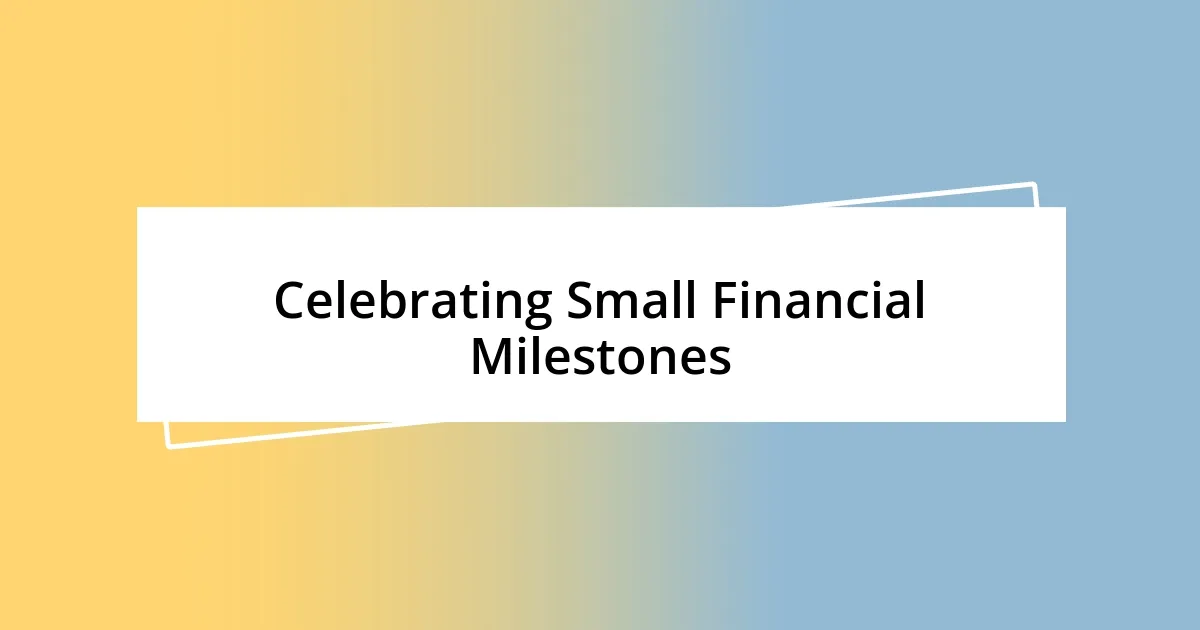
Celebrating Small Financial Milestones
I truly believe that celebrating small financial milestones is crucial for maintaining motivation in my budgeting journey. For instance, I remember the excitement I felt when I reached my first savings goal—to put away $500 for an emergency fund. It may not seem like a huge amount, but I treated myself to a nice dinner, reminding me that each little step counts. Have you ever noticed how acknowledging progress can fuel your desire to keep going?
Another memorable moment was when I finally paid off a small credit card balance that had been lingering for years. Instead of just crossing that off my list and moving on, I decided to do something special. I organized a small get-together with friends to celebrate my newfound financial freedom. The joy I felt surrounded by loved ones reminded me that achieving financial health is not just personal; it can also be a shared experience. How do you celebrate your achievements, no matter how small? It’s essential to mark these occasions to reinforce positive behavior.
I’ve also learned to celebrate intangible victories along the way. For example, there was a time when I consciously chose to cook at home instead of going out, which saved me a pretty penny. I made it a point to celebrate that week by inviting a friend over for a homemade meal, sharing not just food but also my journey toward better budgeting. These moments not only provide a sense of accomplishment, but they also foster a deeper connection with those around me. Isn’t it wonderful how celebrating keeps us engaged and reinforces positive financial habits?












